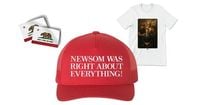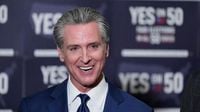California politics have always been a stage for spectacle, but in the late summer of 2025, Governor Gavin Newsom took the art of political parody to new heights. With the presidential race looming and the rivalry between Newsom and President Donald Trump intensifying, the California governor has seized headlines, not just for policy, but for a relentless—and often biting—campaign of online satire. The most recent twist? Newsom’s announcement that he may soon release a satirical cryptocurrency product dubbed the “Trump corruption coin,” a direct jab at Trump’s own foray into the crypto world.
According to Fox News and Politico, Newsom floated the idea at a local summit on August 27, joking, “I think we’ll add a coin, maybe a Trump corruption coin or something.” The governor, clearly amused, added with a laugh that he was “about to come out” with this novelty item through his parody “Patriot Store.” The online shop, which Newsom promoted with the all-caps declaration “THE PATRIOT SHOP IS NOW OPEN!!!!” on X (formerly Twitter), features a host of Trump-inspired merchandise—most notably, a red MAGA-style hat rebranded to read, “NEWSOM WAS RIGHT ABOUT EVERYTHING!”
This isn’t Newsom’s first foray into parody, nor is it simply about poking fun. The governor’s “Governor Newsom Press Office” X account has become a platform for Trump-style memes and posts, many written in the ex-president’s signature bombastic tone. One recent message read, “EXCEPT WHAT IS WRITTEN AND BROADCAST IN THE FAKE NEWS, I NOW HAVE THE HIGHEST POLL NUMBERS I’VE EVER HAD, SOME IN THE 60’S AND EVEN 70’S. THANK YOU. MAKE AMERICA GAVIN AGAIN!!! — GCN.” It’s a clear callback to Trump’s own social media bravado, and the online audience has taken notice.
On August 28, Newsom upped the ante by posting an 87-second parody video on his official account, reenacting Trump’s Oval Office press conferences—complete with charts, tables, and a healthy dose of sarcasm. The video, which quickly became a trending topic, saw Newsom addressing the issue of crime and critiquing Trump’s approach to deploying National Guard troops in Democrat-run cities. “If he is to invest in crime suppression, I hope the President of the United States would look at the facts,” Newsom said, holding up a piece of paper. He pointed out that Republican-led Louisiana has worse crime statistics than California and added, “If the president is sincere about the issue of crime and violence, there’s no question in my mind that he’ll likely be sending the troops into Louisiana and Mississippi to address the unconscionable wave of violence that continues to plague those states.”
The parody didn’t just draw laughs—it sparked a firestorm of commentary across the political spectrum. Supporters praised Newsom’s wit and audacity. As one fan posted on X, “He’s absolutely brilliant at holding the mirror up to the Republican Party hypocrisy!” Another declared, “Gavin is crushing it.” A third, evidently wanting more, suggested, “Now. He must do a cabinet meeting where his people all just give him non-stop adulation as they sit around the table. It must be done. Please.”
But not everyone was impressed. Critics accused Newsom of grandstanding and questioned his fitness for higher office. One detractor insisted, “Gavin Newsom continues to demonstrate his unfitness for the White House.” Still, the governor’s online antics appear to be winning over some skeptics. A self-described former Republican admitted, “Newsom is growing on me.”
Newsom’s relentless lampooning of Trump has fueled speculation that he’s positioning himself as a frontrunner for the Democratic nomination in the 2028 presidential race. While the parodies generate attention and engagement, Newsom has also been keen to highlight what he sees as substantive differences in governance. On August 28, he announced a new initiative to expand the deployment of the California Highway Patrol in partnership with city officials and law enforcement agencies in San Diego, Inland Empire, Los Angeles, Central Valley, Sacramento, and the San Francisco Bay Area. “When the state and local communities work together strategically, public safety improves,” Newsom said in a press release. He added, “While the Trump Administration undermines cities, California is partnering with them—and delivering real results. With these new deployments, we’re doubling down on these partnerships to build on progress and keep driving crime down.”
The feud between Newsom and Trump has grown increasingly personal and public. On August 22, President Trump lashed out, calling Newsom an “incompetent guy with a good line of bulls---.” Newsom, never one to shy away from a retort, fired back on social media by mimicking Trump’s famous “The Apprentice” catchphrase, responding, “Such low energy. SAD!”
Yet, the most pointed barbs have come on the subject of cryptocurrency. Trump has become a vocal promoter of his own memecoin, $TRUMP, and his company, Trump Media and Technology Group, recently disclosed holdings of roughly $2 billion in bitcoin and other digital assets. Newsom, in turn, has not only mocked Trump’s digital currency efforts but also described them as a “crypto grift” during a conversation about the National Guard in Los Angeles, according to News18.
This satirical back-and-forth over crypto isn’t just political theater—it’s a reflection of broader trends in American politics, where meme culture, online branding, and digital currencies have become potent tools in the battle for public attention. Newsom’s “Patriot Store” and his Trump-inspired merchandise are more than mere novelty items; they’re a statement about the intersection of politics, commerce, and internet culture in 2025. Trump’s own embrace of crypto and his company’s billion-dollar digital holdings only amplify the stakes.
As the rivalry escalates, both leaders are leveraging every tool at their disposal—be it parody videos, merchandise, or digital assets—to rally supporters and troll their opponents. For Newsom, the satirical “Trump corruption coin” may never become legal tender, but it’s already proving valuable as a symbol of resistance and a magnet for media attention.
In a political era defined by spectacle, satire, and social media, Newsom’s campaign of parody underscores how the boundaries between governance and entertainment continue to blur. Whether this approach will translate into lasting political capital remains to be seen, but for now, all eyes are on California—and on the next move in this high-stakes, high-humor rivalry.


